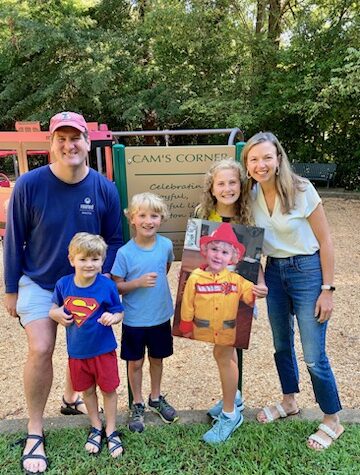as you have received Christ Jesus as Lord, continue to walk in Him, being rooted and built up in Him and established in the faith, just as you were taught, and overflowing with gratitude.
(CSB, Colossians 2:6-7)
After the Gospel ABCs, come the Gospel A—Zs. In Colossians 2:6-7, the little word as leads the initial once-in-a-lifetime salvation experience into continuing to walk in—be rooted in—Jesus Christ. It’s the difference between the very beginning—the ABCs of grace-filled Gospel salvation—and the rest of the Christian’s life all the way into heaven’s eternity.
Cameron and Lauren Cole grew up in families where they heard God, Jesus, Holy Spirit, and all things Christian as a matter of daily life. Meeting Jesus in a genuine faith experience at early ages is not surprising. Several years of life challenges rooted and built them up in their faith and now spills over into their family. However, lots of heartache and growth happened, growing the ABCs into being rooted. Cameron and Lauren voice parts of their story:
“While my passion for sharing the gospel began at a Disciple Now weekend at First Baptist Church of Birmingham in 1993, it climaxed in a children’s hospital resuscitation room on November 11, 2013. On that morning, my wife called me in utter panic, sharing the horror that our three-year-old son, Cam, had stopped breathing and had no pulse when she checked on him in his bed that morning. I raced from a youth campout to a children’s hospital in time for the doctors to tell us they had exhausted all efforts: our baby boy was dead.
“As we went to the resuscitation room to see our son for the last time, Lauren and I recalled our conversation with Cam the previous afternoon. Cam told us that he wanted to ‘go visit Jesus,’ and he suggested that we hop in the car. We explained to Cam that Jesus was with us now in the Holy Spirit and that we would see Jesus face-to-face when God calls us to heaven. He, with a supernatural focus in his eyes, then asked, ‘Will I see Adam and Eve in heaven?’ (Pretty impressive for a three-year-old.) Lauren and I discussed and told Cam that, indeed, God appeared to forgive Adam and Eve’s sin in Genesis 3. Cam replied, ‘I’m not going to eat that apple. I not eat from that tree.’ I told Cam that everyone eats from the tree and disobeys God; that’s why Jesus came. Cam ended this conversation by saying, ‘Jesus died on cross, Jesus died my sins.’ The next morning, Cam passed into God’s kingdom.
“While I have had a passion for proclaiming the gospel of salvation since the seventh grade, never has its beauty and power been so real or palpable as the day we said good-bye to Cam.
Lauren and Cameron continue, “Many parents want their kids to be believers in order ‘to be happy and be good people.’ They often don’t realize the magnitude of eternal salvation. Many think ‘oh, kids can’t understand spiritual things like God’s truths; we’ll get to that later.’ Realistically, kids can have a relationship with Jesus, a profound knowledge of His Word, and can even have ministries at very young ages. Discipling them early, particularly in the knowledge of God’s Word and truth, builds a firm foundation.
“In Rooted Ministry we try to equip and empower parents to become confident in discipling their kids the whole way in every-day life—not just in formal sit-down teaching sessions.
Building
Cameron remembers being very afraid during a tornado in his third-grade year. He recalls praying with his parents and receiving Christ and knowing he was genuinely born again. However, mixed in with his young thinking was “what God wants me to do is try really hard. I became a performance junky throughout high school, college, and grad school. I was a faithful Christian but was 100% performance with no concept of how God’s grace impacted me as a Christian until I hit crash and burn in my first year out of graduate school. I was teaching inner city students and had about two thirds of a nervous breakdown.
“My pastor told me I was a Christian who had no idea what the gospel of rest is, that Jesus carries the burden, that I never have to prove myself by performance, that I was living my life as if I had to justify myself every day, and that Jesus had already done that once and for all. The pastor’s revelations led to a huge transformation where I realized that God’s unconditional love for me on the cross was the key to the gospel of rest.
“A greater sense of freedom and peace replaced the extreme stress and performance and ultimately led me into youth ministry. I really like pursuing relationships, studying the Bible, small group teaching, and discipleship. Jesus gave me His calling, equipped me with skills, passion, missions, and community—not the ‘entertain ’em with super-fun-all-games-just-to-get- the-kids-in-the-door’ mentality—there’s serious eternity and the kingdom of God—so much more than the rah-rah. If you do gospel-centered youth ministry, you are a foundation builder, and building takes time. Temptation comes to do attractional, entertainment-driven youth ministry or behavior modification ministry that gets kids in the door. That’s not making disciples. That’s not forming a kid who has lasting faith. Kids are exposed to hard things at school and learn hard subjects (calculus, physics, analyzing British literature); they can handle God’s Word!
“By far research shows that parents have more spiritual influence over their kids than any other source whether that’s church, the media, youth group, or their peers. Thinking contrary to that is mythology—not grounded in science or research.
“Of course, some parents abdicate their role and turn their kids over to the media, peers, and other sources to typecast their kids. It’s never too late, however. If parents haven’t been equipped and empowered to disciple their kids, they can choose to begin. The Holy Spirit can and will teach and equip a willing parent.”
In Greenville, South Carolina, as a young child, Lauren remembers “bedtime prayers with my mom and asking lots of questions. Almost exclusively, I wanted to know about heaven so as not to go to hell. However, as my faith grew during Christian middle school and throughout college, I gained more understanding of the truth of the Gospel that had penetrated my heart: I was not saved just so I would be good. I actively participated in Campus Crusade for Christ, its summer projects, and even worked a year with international missions in Asia. Afterwards, I spent three years working in campus ministry.”
as you have received Christ Jesus as Lord, continue to walk in Him, being rooted and built up in Him and established in the faith, just as you were taught, and overflowing with gratitude.
(CSB, Colossians 2:6-7)
After the Gospel ABCs, come the Gospel A—Zs. In Colossians 2:6-7, the little word as leads the initial once-in-a-lifetime salvation experience into continuing to walk in—be rooted in—Jesus Christ. It’s the difference between the very beginning—the ABCs of grace-filled Gospel salvation—and the rest of the Christian’s life all the way into heaven’s eternity.
Cameron and Lauren Cole grew up in families where they heard God, Jesus, Holy Spirit, and all things Christian as a matter of daily life. Meeting Jesus in a genuine faith experience at early ages is not surprising. Several years of life challenges rooted and built them up in their faith and now spills over into their family. However, lots of heartache and growth happened, growing the ABCs into being rooted. Cameron and Lauren voice parts of their story:
“While my passion for sharing the gospel began at a Disciple Now weekend at First Baptist Church of Birmingham in 1993, it climaxed in a children’s hospital resuscitation room on November 11, 2013. On that morning, my wife called me in utter panic, sharing the horror that our three-year-old son, Cam, had stopped breathing and had no pulse when she checked on him in his bed that morning. I raced from a youth campout to a children’s hospital in time for the doctors to tell us they had exhausted all efforts: our baby boy was dead.
“As we went to the resuscitation room to see our son for the last time, Lauren and I recalled our conversation with Cam the previous afternoon. Cam told us that he wanted to ‘go visit Jesus,’ and he suggested that we hop in the car. We explained to Cam that Jesus was with us now in the Holy Spirit and that we would see Jesus face-to-face when God calls us to heaven. He, with a supernatural focus in his eyes, then asked, ‘Will I see Adam and Eve in heaven?’ (Pretty impressive for a three-year-old.) Lauren and I discussed and told Cam that, indeed, God appeared to forgive Adam and Eve’s sin in Genesis 3. Cam replied, ‘I’m not going to eat that apple. I not eat from that tree.’ I told Cam that everyone eats from the tree and disobeys God; that’s why Jesus came. Cam ended this conversation by saying, ‘Jesus died on cross, Jesus died my sins.’ The next morning, Cam passed into God’s kingdom.
“While I have had a passion for proclaiming the gospel of salvation since the seventh grade, never has its beauty and power been so real or palpable as the day we said good-bye to Cam.
Lauren and Cameron continue, “Many parents want their kids to be believers in order ‘to be happy and be good people.’ They often don’t realize the magnitude of eternal salvation. Many think ‘oh, kids can’t understand spiritual things like God’s truths; we’ll get to that later.’ Realistically, kids can have a relationship with Jesus, a profound knowledge of His Word, and can even have ministries at very young ages. Discipling them early, particularly in the knowledge of God’s Word and truth, builds a firm foundation.
“In Rooted Ministry we try to equip and empower parents to become confident in discipling their kids the whole way in every-day life—not just in formal sit-down teaching sessions.
Cameron remembers being very afraid during a tornado in his third-grade year. He recalls praying with his parents and receiving Christ and knowing he was genuinely born again. However, mixed in with his young thinking was “what God wants me to do is try really hard. I became a performance junky throughout high school, college, and grad school. I was a faithful Christian but was 100% performance with no concept of how God’s grace impacted me as a Christian until I hit crash and burn in my first year out of graduate school. I was teaching inner city students and had about two thirds of a nervous breakdown.
“My pastor told me I was a Christian who had no idea what the gospel of rest is, that Jesus carries the burden, that I never have to prove myself by performance, that I was living my life as if I had to justify myself every day, and that Jesus had already done that once and for all. The pastor’s revelations led to a huge transformation where I realized that God’s unconditional love for me on the cross was the key to the gospel of rest.
“A greater sense of freedom and peace replaced the extreme stress and performance and ultimately led me into youth ministry. I really like pursuing relationships, studying the Bible, small group teaching, and discipleship. Jesus gave me His calling, equipped me with skills, passion, missions, and community—not the ‘entertain ’em with super-fun-all-games-just-to-get- the-kids-in-the-door’ mentality—there’s serious eternity and the kingdom of God—so much more than the rah-rah. If you do gospel-centered youth ministry, you are a foundation builder, and building takes time. Temptation comes to do attractional, entertainment-driven youth ministry or behavior modification ministry that gets kids in the door. That’s not making disciples. That’s not forming a kid who has lasting faith. Kids are exposed to hard things at school and learn hard subjects (calculus, physics, analyzing British literature); they can handle God’s Word!
“By far research shows that parents have more spiritual influence over their kids than any other source whether that’s church, the media, youth group, or their peers. Thinking contrary to that is mythology—not grounded in science or research.
“Of course, some parents abdicate their role and turn their kids over to the media, peers, and other sources to typecast their kids. It’s never too late, however. If parents haven’t been equipped and empowered to disciple their kids, they can choose to begin. The Holy Spirit can and will teach and equip a willing parent.”
In Greenville, South Carolina, as a young child, Lauren remembers “bedtime prayers with my mom and asking lots of questions. Almost exclusively, I wanted to know about heaven so as not to go to hell. However, as my faith grew during Christian middle school and throughout college, I gained more understanding of the truth of the Gospel that had penetrated my heart: I was not saved just so I would be good. I actively participated in Campus Crusade for Christ, its summer projects, and even worked a year with international missions in Asia. Afterwards, I spent three years working in campus ministry.”
Lauren is now a young mother whose three children are now in school. She stands with Cameron, fully supporting him in Rooted Ministry and within their church with Bibles studies, young adults, and college graduates. Lauren has the honored position of first hearing the sermon or the teaching her husband is going to present and being the first to read every chapter he writes. Cameron speaks highly of her and depends on her to be his first filter in God’s work.
Rooted Ministry: More than a chaperone (Gospel-Centered Youth Ministry: A Practical Guide)
Historically, some churches have had a false paradigm for what youth ministry should look like. Churches may hire a youth pastor to be a gatherer—a pied piper. Abolishing that paradigm and helping churches understand that a youth pastor is a leader and a pastor—a teacher of God’s Word—is paramount. In the same way that a senior pastor is expected to be a student of God’s Word and a person who spends time in exegesis and interpretation, a youth pastor is to dedicate himself to biblical study. His ministry is to a different segment of the congregation, but he is still a leader and a teacher of God’s Word. Pastors need to help parents have a vision for discipleship ministry—what it looks like to form children into followers of Jesus with lasting, sustainable faith. A youth pastor needs to know how to read, interpret, and teach God’s word, focusing on three commitments: Grow personal faith, build relationships, and study-study-study. Kids can tell if a leader is not prepared. A youth pastor is a pastor, a leader, but also a teacher of God’s Word. Do it with credibility.
Rooted Ministry: The heart of youth ministry
We long to see God heal, redeem, and free young people as they trust Jesus personally; to see God birth something beautiful and redemptive in this broken world through their lives. We ache at the commonplace sufferings these young people endure. Witnessing the awkward, insecure, acne phases of middle school and the failed fashion experiments of high school makes me cringe. Seeing kids screaming for attention through provocative tweets and Facebook messages breaks my heart. Knowing the loneliness and alienation that comes in these years of self-doubt, religious questioning, and parental conflict causes me to lament. The heart of Rooted Ministry is that every child will receive Grace filled, Gospel centered, Bible saturated discipleship at church and at home. Effective discipleship is equipping parents and churches to disciple kids to life-long faith in Christ. Parents need a sense of urgency in their prayers for their children, in their commitment to church, and their willingness to share the Gospel with their children. Our son was healthy and just died mysteriously without explanation one night. Life is fragile.
Rooted Ministry: Word training
Priority for students is increasing their ability to competently read, study, understand, and apply God’s Word. Paul’s well-known words to Timothy remind us that [Scriptures] are able to make you wise for salvation through faith in Jesus Christ. All Scripture is breathed out by God and profitable for teaching, for reproof, for correction, and for training in righteousness that the man of God may be complete, equipped for every good work (2 Timothy 3:15b–17). God’s Word put to work can make Christians competent and well equipped for good works of obedience and ministry.
Rooted Ministry: Discipleship training
Students must not be merely told to mentor younger students; they must be shown how to walk with someone in a gospel-centered, Word-driven, prayer-empowered discipleship relationship. Youth pastors do this by modeling these kinds of relationships to their student leaders by discipling and mentoring them personally. With that foundation laid, youth pastors can explain to their youth leaders why they did what they did, their motivation for it, and how the student can apply those same discipleship principles to a relationship with a younger student.
Rooted Ministry: Evangelism training
Youth pastors and leaders should be training their students to share the biblical gospel fully, clearly, faithfully, and relevantly to unbelievers. Shame on us if we preach at them again and again, ‘Share the gospel with your friends,’ yet never equip them to do this well! Give them content; train and equip them to share the full biblical gospel, summarizing the story of the Bible—from creation to fall to redemption to the hope of future glory and restoration. They can learn to share it clearly and succinctly! Practice sharing the gospel—first in the safety of the youth ministry, but then in the ‘field.’ Have conversations with people who are not part of the church. The only way to get better at having these conversations is to start doing it.
Youth ministry has a valuable, long-term role in the church. With that said, we do need to have a broader definition and understanding of what role youth ministry plays in the life of the church.
Historically, some churches have had a false paradigm for what youth ministry should look like. Churches may hire a youth pastor to be a gatherer—a pied piper. Abolishing that paradigm and helping churches understand that a youth pastor is a leader and a pastor—a teacher of God’s Word—is paramount. In the same way that a senior pastor is expected to be a student of God’s Word and a person who spends time in exegesis and interpretation, a youth pastor is to dedicate himself to biblical study. His ministry is to a different segment of the congregation, but he is still a leader and a teacher of God’s Word. Pastors need to help parents have a vision for discipleship ministry—what it looks like to form children into followers of Jesus with lasting, sustainable faith. A youth pastor needs to know how to read, interpret, and teach God’s word, focusing on three commitments:Grow personal faith, build relationships, and study-study-study. Kids can tell if a leader is not prepared. A youth pastor is a pastor, a leader, but also a teacher of God’s Word. Do it with credibility.
Rooted Ministry: The heart of youth ministry
We long to see God heal, redeem, and free young people as they trust Jesus personally; to see God birth something beautiful and redemptive in this broken world through their lives. We ache at the commonplace sufferings these young people endure. Witnessing the awkward, insecure, acne phases of middle school and the failed fashion experiments of high school makes me cringe. Seeing kids screaming for attention through provocative tweets and Facebook messages breaks my heart. Knowing the loneliness and alienation that comes in these years of self-doubt, religious questioning, and parental conflict causes me to lament. The heart of Rooted Ministry is that every child will receive Grace filled, Gospel centered, Bible saturated discipleship at church and at home. Effective discipleship is equipping parents and churches to disciple kids to life-long faith in Christ. Parents need a sense of urgency in their prayers for their children, in their commitment to church, and their willingness to share the Gospel with their children. Our son was healthy and just died mysteriously without explanation one night. Life is fragile.
Rooted Ministry: Word training
Priority for students is increasing their ability to competently read, study, understand, and apply God’s Word. Paul’s well-known words to Timothy remind us that [Scriptures] are able to make you wise for salvation through faith in Jesus Christ. All Scripture is breathed out by God and profitable for teaching, for reproof, for correction, and for training in righteousness that the man of God may be complete, equipped for every good work (2 Timothy 3:15b–17). God’s Word put to work can make Christians competent and well equipped for good works of obedience and ministry.
Rooted Ministry: Discipleship training
Students must not be merely told to mentor younger students; they must be shown how to walk with someone in a gospel-centered, Word-driven, prayer-empowered discipleship relationship. Youth pastors do this by modeling these kinds of relationships to their student leaders by discipling and mentoring them personally. With that foundation laid, youth pastors can explain to their youth leaders why they did what they did, their motivation for it, and how the student can apply those same discipleship principles to a relationship with a younger student.
Rooted Ministry: Evangelism training
Youth pastors and leaders should be training their students to share the biblical gospel fully, clearly, faithfully, and relevantly to unbelievers. Shame on us if we preach at them again and again, ‘Share the gospel with your friends,’ yet never equip them to do this well! Give them content; train and equip them to share the full biblical gospel, summarizing the story of the Bible—from creation to fall to redemption to the hope of future glory and restoration. They can learn to share it clearly and succinctly! Practice sharing the gospel—first in the safety of the youth ministry, but then in the ‘field.’ Have conversations with people who are not part of the church. The only way to get better at having these conversations is to start doing it.
Youth ministry has a valuable, long-term role in the church. With that said, we do need to have a broader definition and understanding of what role youth ministry plays in the life of the church.















1